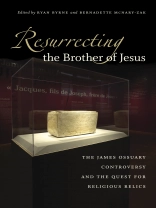In 2002 a burial box of skeletal remains purchased anonymously from the black market was identified as the ossuary of James, the brother of Jesus. Transformed by the media into a religious and historical relic overnight, the artifact made its way to the Royal Ontario Museum in Toronto, where 100, 000 people congregated to experience what had been prematurely and hyperbolically billed as the closest tactile connection to Jesus yet unearthed. Within a few months, however, the ossuary was revealed to be a forgery. Resurrecting the Brother of Jesus offers a critical evaluation of the popular and scholarly reception of the James Ossuary as it emerged from the dimness of the antiquities black market to become a Protestant relic in the media’s custody.
The volume brings together experts in Jewish archaeology, early Christianity, American religious history, and pilgrimage to explore the theory and practice couched in the debate about the object’s authenticity. Contributors explore the ways in which the varying popular and scholarly responses to the ossuary phenomenon inform the presumption of religious meaning; how religious categories are created, vetted, and used for various purposes; and whether the history of pious frauds in America can help to illuminate this international episode. Resurrecting the Brother of Jesus also contributes to discussions about the construction of religious studies as an academic discipline and the role of scholars as public interpreters of discoveries with religious significance.
Contributors:
Thomas S. Bremer, Rhodes College
Ryan Byrne, Menifee, California
Byron R. Mc Cane, Wofford College
Bernadette Mc Nary-Zak, Rhodes College
Milton Moreland, Rhodes College
Jonathan L. Reed, University of La Verne
Despre autor
Bernadette Mc Nary-Zak is associate professor of religious studies at Rhodes College.







![Copertina de Brian Schrag & Julisa Rowe: Community Arts for God's Purposes [Chinese] 貼近神心意的社群藝術 Copertina de Brian Schrag & Julisa Rowe: Community Arts for God's Purposes [Chinese] 貼近神心意的社群藝術](https://static.worldofdigitals.com/thumb_webp/740/9781645083740.webp)




